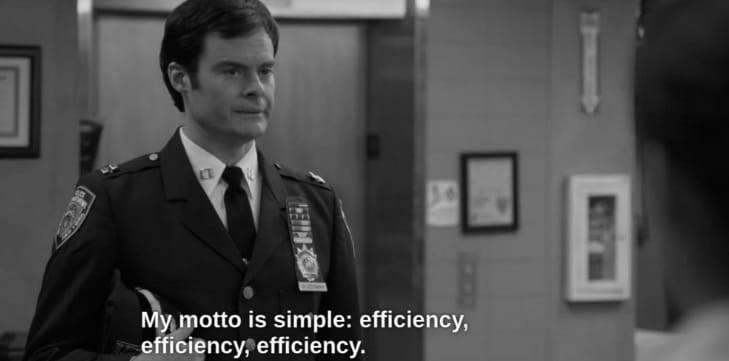Jaylen Brown Forced the Pacers to Submit in Game 2

NBA voters cemented their hypocrisy when the All-NBA votes dropped earlier this week. The media likes to say that what they want from people is to sacrifice for the team in pursuit of a championship, but what they really want is for players to put up stats that seem undeniable so their voting isn't questioned. It was ridiculous that Jaylen Brown was left off of the All-NBA teams, and a testament to how little voters actually pay attention to the little things, when they can reward gaudy box score stats. Jaylen killed two birds with one stone in Game 2 by dropping 40 – he publicly shamed the voters foolish enough to not vote for him, and his play forced the Pacers to concede Game 2.
This season, Jaylen sacrificed his shots just like Jayson Tatum did. But where Tatum still takes a few questionable shots per game, Brown has worked hard to become more efficient. Everything is more intentional – his dribbling, his cutting, his decision-making, even the way in which he took shots. In years past, Jaylen frequently went for the challenge dunk to try to put someone on a poster. This season, he only did so when he knew he had the play well in hand. His movements are more streamlined – he goes right to the bucket, no dancing. As the season progressed, he only got better. He shot .492 from the floor and .342 from three in the first half, and .514 and .381, respectively, in the second half. Him just getting better at all of this also allows a little wiggle room for Tatum's questionable decisions. In the past, when both of them made head-scratching decisions, games would sometimes snowball out of control. Brown's quest for self-optimization has made the C's much, much harder to play.
JB's prowess was on full display in Game 2. He scored Boston's first five points and seven of its first nine. But the second and third quarter is when he really took over, as he shot 10-for-17 in that stretch. A couple of really nice plays from JB essentially ended the game in the third. After the Pacers had pulled within two points, the C's did what they have usually done this season, which is methodically build the lead back up. But when Myles Turner got loose on a baseline out of bounds play and drained a three to pull it back Indiana to within six points, it seemed like they would hang around like they did in Game 1.
Then the following things happened:
- JB drained a three when the defense collapsed on Jayson Tatum
- Indiana couldn't score on a possession where they got off four shots thanks to three offensive rebounds
- JB drove to the hoop and drew three bodies and all 10 eyes to him, and then made a perfect to Oshae Brissett for a room service dunk
- Haliburton was subbed out of the game
Brissett's dunk gave the Celtics an 11-point lead at 82-71. Indiana would not get any closer the rest of the night, as Pacers coach Rick Carlisle conceded what was technically still a winnable game for Indiana (more on that in a minute). He did so because at that point it was pretty clear that JB was not going to be denied, and Tatum and Derrick White had started to cook as well.
Rick Carlisle Concedes
As mentioned above, the Pacers were down 11 points when their coach, Rick Carlisle, took Tyrese Haliburton out. He went back to the locker room, and never returned. Ostensibly, he has hamstring soreness, but he was listed only as Questionable for Game 3, and not Out. I don't enjoy questioning whether someone is hurt, but I think unless you have a severe sprain or broken bone, you should be out there. When all you have is "soreness," to me you're leaving yourself open to being questioned about whether you packed it in.
The fact that Carlisle also removed three other starters early leads me to that conclusion. In addition to Haliburton's early exit, the following happened:
- Aaron Nesmith came out with 5:20 left in the third quarter and didn't return.
- Myles Turner came out at the start of the fourth quarter and didn't return.
- Pascal Siakam came out with 9:26 left in the fourth quarter and didn't return.
I can't find the quote at the moment, but Carlisle said his guys were "tired." I find this hard to believe. Nesmith came out for fouls, and it could be assumed that he would have been back in at the start of the fourth. It was a 13-point game at that point. I have never seen Nesmith tired – energy and hustle comprises most of his on-court persona – so I don't buy that for a second.
Turner had just started to get going in the third quarter. He scored all eight of his points in the quarter, and at the end of the quarter, he had played just 24 minutes. You'd think he'd want to be out there since he had finally got on track.
Siakam was cooking the entire game. He shot 13-for-17 and only played 31 minutes. It was a 17-point game at the point he came out, so that is slightly more defensible. But it should be noted that Siakam led the NBA in minutes played per game in 2021-22 and 2022-23, and he averaged more than 37 minutes per game in both of those seasons. Siakam was fine.
I just don't see a reason why you would concede the game. Leads disappear quickly these days in the NBA, and as much as I love them, this Celtics team has famously blown a lot of leads late historically, and this season as well. If you truly believed those few minutes of extra rest were going to give you a leg up in Games 3 and 4, maybe I could squint and see it, but the C's had plenty of time off after both of their first two series'. It's not like they've been taxed. I would have kept competing.
Of course, no one wanted to accuse Indiana of conceding after the fact, but Jaylen Brown walked right up to the line. “It was a little surprising,” Celtics forward Jaylen Brown said of Indiana’s late-game approach. “I don’t know what the reasoning behind it was, but we were focused on winning the game.”
Joe Mazzulla Makes Adjustments
In his first season at the helm, Joe Mazzulla was so stubborn about making changes that he needed to be publicly questioned multiple times before making adjustments. In the second-round series against Philly, Mazzulla refused to insert Robert Williams III (sigh, I miss Rob) into the starting lineup until Game 6, even though it was painfully obvious that the team needed to play bigger in order to combat Joel Embiid. Rob was a +18 and +19 in Games 6 and 7, and was a significant help in getting the C's over the hump in that series.
Contrast that to this week. There were a few things that Mazzulla seemingly corrected in Game 2. The first was keeping Jayson Tatum in at the end of the third quarter. It was immediately noticed that Indiana made a big run toward the end of Game 1's third quarter right when Tatum came out. In Game 2, Tatum played those minutes, and there was no run. Now, perhaps there was no run because Tyrese Haliburton and Aaron Nesmith had exited the game, but Mazzulla can't control that. And TJ McConnell has keyed plenty of Indiana runs this season.
The second was kind of a two-part adjustment. One part was Mazzulla keeping Al Horford's minutes in check, and the second was how he did so. After Big Al played 39:35 in Game 1, and front rimmed a great deal of his three-point attempts, I looked for Mazzulla once again to limit Al's minutes in Game 2. He did. Al played just 24:58 in Game 2. But when Luke Kornet hurt his wrist in the early going of Game 2, I was worried that Mazzulla would keep riding Horford. Instead, he kept Al's minutes in check by doing what I and many others have called for – he put Oshae Brissett into the game. Brissett's energy was infectious. He had three rebounds and three steals in 12 minutes, and as mentioned above, his heads up cut to get a dunk in the third seemed like the straw that broke the camel's back. Maybe it was an obvious move, and maybe Kornet's injury forced his hand, but credit to Mazzulla for making the move nonetheless.
Another adjustment that I really think was a big deal was who Horford guarded. In Game 1, Horford was on Myles Turner, and got put into a lot of pick and rolls, because Turner is the perfect pick-and-roll partner for Tyrese Haliburton. Turner can roll to the hoop for dunks and pop out for three pointers. I don't have the data to back this up because it isn't publicly available, but anecdotally it seems that Pascal Siakam isn't used in the pick and roll as frequently. Siakam (2.5 attempts with Indy in the regular season, 2.7 in the playoffs) definitely doesn't shoot as many three's as Turner (4.2, 5.2), so Al is pulled out to the perimeter less when covering Siakam. That's good, because the C's want to keep Al in drop coverage closer in to the rim.
It wasn't a perfect strategy, as Siakam cooked all game. But 15 of his 17 shots were two pointers, and just didn't hurt as much as did the three's hit over Al in Game 1. In Game 1, there also seemed to be a multiplier effect, as many players got cooking after getting Al in a switch. Perhaps I'm overstating – Indy shot 53.5% from the floor in Game 1, and 52.4% from the floor in Game 2. Perhaps if Haliburton and the other starters stayed in the game, their 110 points in Game 2 would have creeped closer to their 128 in Game 1. But it was a noticeable change from Mazzulla to move Horford from Turner to Siakam, and I think in the aggregate the fact that Mazzulla was willing to make adjustments even after a game that the C's won is important to note in his growth as a head coach.
